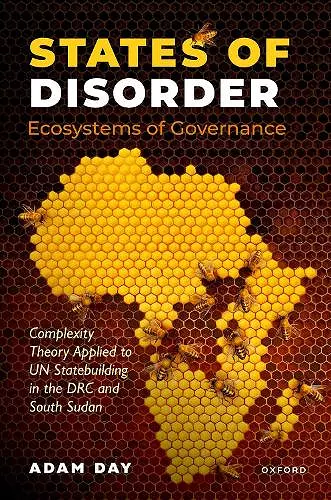States of Disorder, Ecosystems of Governance
Complexity Theory Applied to UN Statebuilding in the DRC and South Sudan
Format:Hardback
Publisher:Oxford University Press
Published:21st Apr '22
Currently unavailable, and unfortunately no date known when it will be back

Today's vision of world order is founded upon the concept of strong, well-functioning states, in contrast to the destabilizing potential of failed or fragile states. This worldview has dominated international interventions over the past 30 years as enormous resources have been devoted to developing and extending the governance capacity of weak or failing states, hoping to transform them into reliable nodes in the global order. But with very few exceptions, this project has not delivered on its promise: countries like Somalia, Afghanistan, South Sudan, and the Democratic Republic of the Congo (DRC) remain mired in conflict despite decades of international interventions. States of Disorder addresses the question, 'Why has UN state-building so consistently failed to meet its objectives?'. It proposes an explanation based on the application of complexity theory to UN interventions in South Sudan and DRC, where the UN has been tasked to implement massive stabilization and state-building missions. Far from being ''ungoverned spaces," these settings present complex, dynamical systems of governance with emergent properties that allow them to adapt and resist attempts to change them. UN interventions, based upon assumptions that gradual increases in institutional capacity will lead to improved governance, fail to reflect how change occurs in these systems and may in fact contribute to underlying patterns of exclusion and violence. Based on more than a decade of the author's work in peacekeeping, this book offers a systemic mapping of how governance systems work, and indeed work against, UN interventions. Pursuing a complexity-driven approach instead helps to avoid unintentional consequences, identifies meaningful points of leverage, and opens the possibility of transforming societies from within.
This book is a welcome contribution to our scholarly understanding ofthe UN's approach to statebuilding … * Dr Andrew E. Yaw Tchie, Senior Research Fellow at the Norwegian Institute ofInternational Affairs , International Peacekeeping *
The United Nations is sent to build peace in some of the hardest conflicts on earth. Adam Day has been in the trenches and draws on years of observations to show how simplistic attempts to build states make the situation worse. But this is no glib critique of international liberalism or predatory states: Day's deft use of complexity theory offers a deep understanding of how systems of governance are ordered and how international interventions could do better if they took the time to understand the relationships on which order is built. Every UN, World Bank, and foreign office staffer should read this crucial book. * Rachel Kleinfeld, author of A Savage Order: How the World's Deadliest Countries Can Forge a Path to Security *
A masterwork. This book will fundamentally change your thinking on why the UN too often fails when intervening in conflict zones, and how they must reform their approach to be effective in the current era. Combining empirically-based insights from complexity science on how entrenched systems do and do not change with his lived experience and research in some of the most intractable settings of our time, Adam Day delivers a brilliant treatise and actionable steps. This should be mandatory reading at the UN, as well as in all university courses in international affairs and peace studies. A tour de force! * Peter Coleman, Founding Director of The Advanced Consortium on Cooperation, Conflict and Complexity at The Earth Institute at Columbia. Author of The Way Out: How to Overcome Toxic Polarization *
States of Disorder makes a bold claim: Because systems of governance evolve and adapt over time, United Nations interventions regularly contribute to exclusion and violence. Thankfully, Adam also shows that avoiding such unintended consequences-and helping transform authoritarian states for the better-is possible. His unique insights, born from an innovative use of complexity theory combined with deep first-hand experience, should be required reading for anyone involved in peacebuilding or conflict resolution. * Séverine Autesserre, Author of Peaceland and The Frontlines of Peace *
Adam Day offers a healthy critique of the self-serving mantra of interventionists who patronizingly talk of "fragile states" and claim "to extend state authority" but regularly fail. After the Afghan debacle, it is high time to re-visit traditional assumptions, and acknowledge that, as the author reminds us, "there is no disorder on earth; life is constantly re-ordering itself". We just don't see it, and ignore at our own peril the networks and relationships that intervention disrupts. * Jean-Marie Guéhenno, Former United Nations Under-Secretary-General for Peacekeeping Operations, Director of International Conflict Resolution at Columbia University's School for International and Public Affairs *
States of Disorder offers a powerful insider's critique of UN state-building efforts. We've long known that the liberal statehood approach to conflict resolution has run its course. But Adam offers hope: if the UN wishes to exert influence and fulfil the goal of reducing violence, rather than impose external models, it can gradually understand the complex systems of governance and web of relationships at work in societies riven by conflicts and evolve new ways of managing growing levels of violence in many parts of the world. * Comfort Ero, President and CEO of International Crisis Group *
The book demonstrates that complexity theory can help us see how our multilateral, interconnected and complex world can self-organise in response to changes, and how different models of governance can exist and contribute to overcoming profound challenges in a world where key interconnected and powerful non-state actors wield increasing influence over states. * Laura Salich Di Francesca, The International Spectator *
ISBN: 9780192863898
Dimensions: 240mm x 162mm x 20mm
Weight: 488g
216 pages